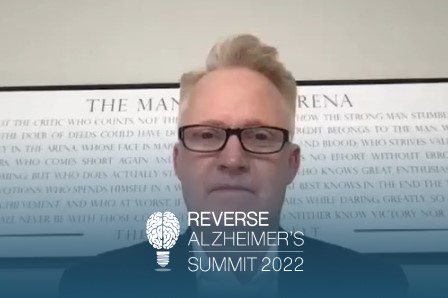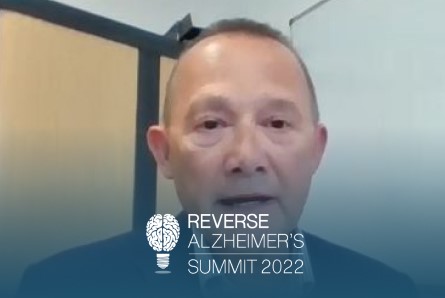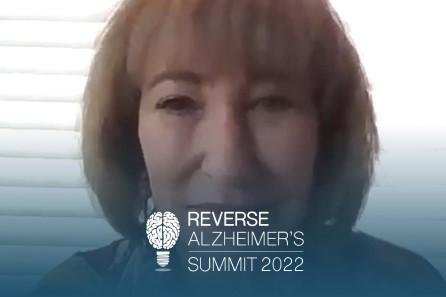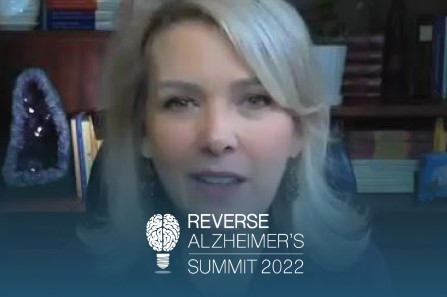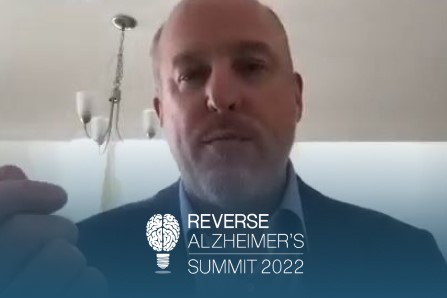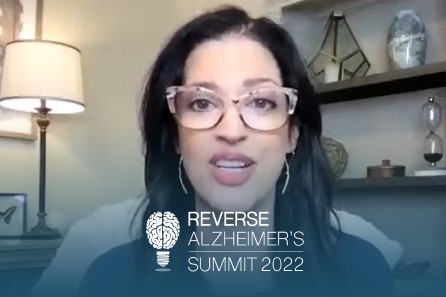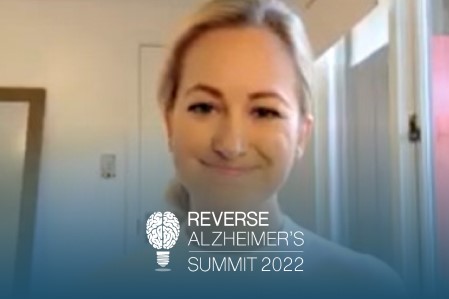Join the discussion below
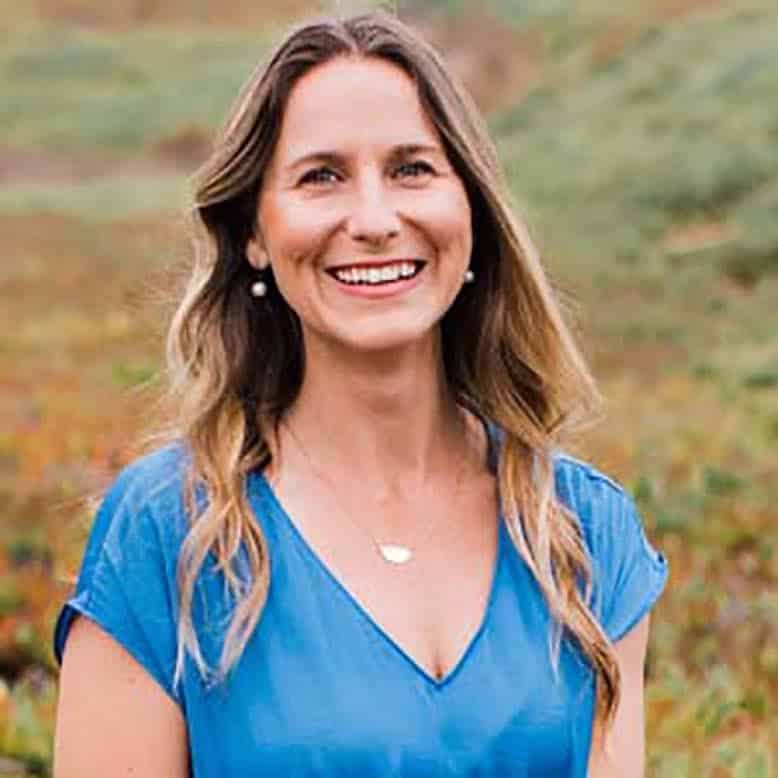
Dr. Heather Sandison is the founder of Solcere Health Clinic and Marama, the first residential care facility for the elderly of its kind. At Solcere, Dr. Sandison and her team of doctors and health coaches focus primarily on supporting patients looking to optimize cognitive function, prevent mental decline, and reverse... Read More
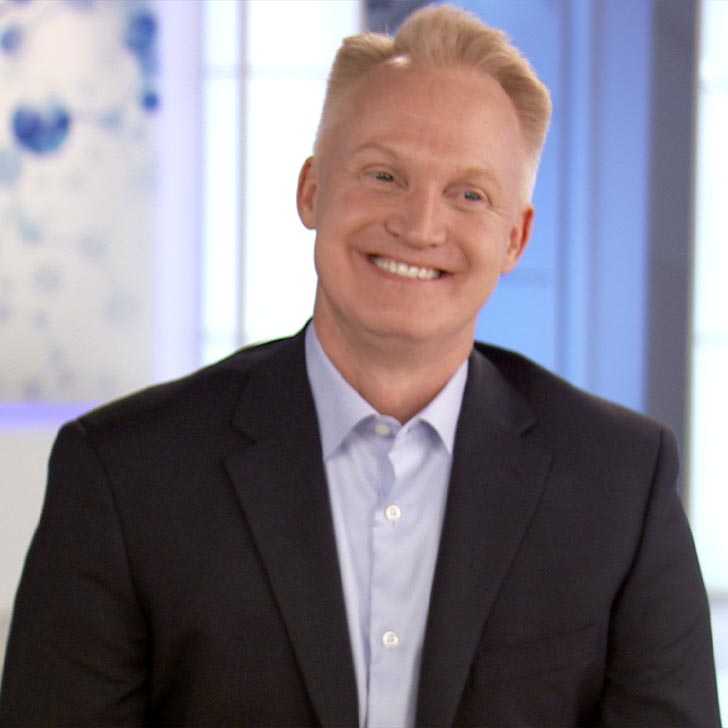
For more than 25 years, Darrin Peterson has been a pioneer in the natural products industry. After co-founding OrderDog, Inc., a technology-based company that provides supply chain services and solutions in the natural product industry, Darrin founded the supplement manufacturing firm, LifeSeasons, Inc. This company was built on the principle... Read More
- The best nutrients for brain health.
- Working with Dr. Bredesen to formulate products.
- How to know if you are buying high quality supplements.
Heather Sandison, N.D.
Welcome to this episode of the Reverse Alzheimer’s podcast. I’m your host, Dr. Heather Sandison and I couldn’t be more delighted to introduce you to Darrin Peterson today. For more than 25 years, Darrin has been a pioneer in the natural products industry. After co-founding Orderdog Incorporated, a tech-based company that provides supply chain services and solutions in the natural product industry. Darrin then founded the supplement manufacturing firm Life Seasons. This company was built on the principle that nature works and science proves it. Life Seasons supplements can be found in over 4,000 retail locations across the US and are sold internationally as well. In addition, Darrin currently serves on the board of Apollo Health and GEMS Development Foundation, where he is serving as president. He’s also provided a vision to expand the GEMS mission, so that the citizens of South Sudan and other countries will have access to the basics of life and dignity that they deserve. Darrin, thank you so much for joining us. Welcome.
Darrin Peterson
Thank you, Dr. Sandison for having me.
Heather Sandison, N.D.
Of course. So you have worked with Dr. Dale Bredeson for a long time, and he’s obviously the, the man to formulate these supplements. He knows a ton about reversing dementia and about creating, basically putting together the nutrients for, that are the best ones for our brain health. So how did you guys start working together? How did you meet.
Darrin Peterson
You know, it’s great, great question. It’s, it’s kind of a long story, but his book came out. We obviously haven’t crossed paths, but are obviously interested in generally just helping people’s conditions or, or kind of their chronic diseases and things like that. Read his book, we reached out to the current CEO, Lance at Apollo, Lance Kelly at Apollo Health, and we just started kind of having a discussion about what Dale’s doing, what their mission at Apollo Health was. We were interested in just some of his protocol, what he was doing from a supplementation standpoint. And Lance brought up that one of the biggest challenges of the Bredesen Protocol was the supplement regimen. And again, the supplements are only part of the protocol. Obviously there’s a lot of lifestyle changes and intermittent fasting and keto diets and things like that. But they literally, all the different, is they were running up against, you know, Dale’s been at this for over 30 years and as their AI was identifying certain nutrients, that would be critical in helping people in either the reversal or the prevention of Alzheimer’s.
Just the supplement side of it became almost overwhelming to, for people staying on the regimen or on the protocol. That part of it. Well, Life Seasons has already kind of taken that approach in the natural products industry when it came to combining supplementation for specific chronic diseases and the synergistic benefit that can take place when combining certain ingredients. And so Dale came out, he visited our facility, met with our biochemist. He’s very, very particular as you know, and very, very passionate about people wanting to stay on the protocol and seeing the results that he knows can happen. And so, you know, we took our current processes in place, combined those with Dale’s vision and came up with a solution that significantly facilitated people’s ability to adhere to the supplement protocol of Dale’s overall Bredesen Protocol.
Heather Sandison, N.D.
Right. I see that clinically with my patients, right? It’s so many pills, so there’s pill fatigue, or they’re gagging on how many there are. And then also, it’s just the logistics of it, right? Like if you’re on Curcumin and Resveratrol and, you know, Magnesium and this and that and all these different things, and you’ve gotta, you’re running out of one this week and the next one next week, and you’ve gotta keep track of all of this. It simplifies it so much to combine these things. And then as you mentioned, I’m an, you know, I’m a Naturopath, so I love and appreciate the synergy of, especially herbs as they start to work together, but the nutrients as well. So getting that, that kind of benefit of combining things in from multiple perspectives, even cost wise, you end up spending less. There’s less packaging, there’s less shipping. There’s less everything when you can start to combine these products. So would you break down for us? I know you guys have something for Recode and then something for Precode.
Darrin Peterson
Yeah. Precode.
Heather Sandison, N.D.
So let our audience know, like what, what are the options. Like if they go to your website, what are the options and kind of, what are they do? How do they choose?
Darrin Peterson
Yeah. So I think the Recode on the reversal where people have progressed a little further in their disease, I think it’s critical that they’re working one with a physician. Two, they’ve done their labs. Three it’s kind of hit Apollo Health’s AI, and is, is basically identifying what contributing factors, right? Is it a trophic, a tropic? Is it their blood sugar levels? Is it trauma, whatever it may be. And so what we’ve done is we’ve built kind of a core kit. This is on the reversal side that I think would be important to work with in conjunction with a physician. So there’s a core kit, there’s an A.M. and a P.M. morning drink. I think the other thing that we’ve done to help on that pill fatigue, as you’ve mentioned, is to change up the delivery forms a little bit. So it’s not just so many pills, right? And in some ways in different delivery forms, you can actually expand and get more in there. So we’ve actually developed the A.M. and the P.M. We’ve broken that out. This is your morning balance and your evening balance. We’ve broken out those ingredients that one, are critical for the protocol overall, but morning that are gonna be more energizing, so to speak. And in those in the evening, that’ll help you get better sleep. We know that good sleep is part of Dr. Bredesen’s protocol and also the way that we’ve made it so that they can maintain their ketosis through the evening, so there’s not a ton of sugar and different things like that.
So there’s a morning and an evening drink that they take, they can just open it up, put it in water, put it in something, that’s the foundation there. And then with that, there’s also supplementation of a thousand DHA with an EPA of 600 milligrams. Then there’s an antioxidant, a probiotic and a multivitamin. Now the great thing about all this is, all of this has been considered so people aren’t getting any toxicity levels of one mineral or vitamin or another, like not too much selenium or chromium or whatever. And so that’s your core kit that all patients that are wanting to kind of reverse that have kind of progressed in Alzheimer’s. And then from there, the blood test that they take will identify subtypes, and then we’ve built out the individual subtypes. Sometimes that’s two different subtypes or three different subtypes. So we’ve simplified the process so much. And, and again, these are patients that are already struggling with difficulty and cognition, right. And trying to remember when to take things and how many, and did I take this and whatever, anything we can do to simplify that process and help them on that protocol.6 I think, and that’s what we accomplished and that’s what Dale was really, really interested in, that’s on the reversal side, so.
Heather Sandison, N.D.
So that’s huge, right. Cause I certainly see it, the people who don’t get the benefit of the Bredesen protocol are the ones that just can’t implement. And we’re talking about people who have cognitive decline, and this is a complex protocol, even for someone with full cognitive capacity. So any place that we can simplify adds a tremendous amount of value and accessibility. So it’s really exciting. And then what about on the Precode side, so on prevention side.
Darrin Peterson
Yeah. And again, to your point, this is all about compliance, right? Dale’s protocol is a little bit complex, but when, when people are compliant, we’ve all seen the results of it. So again, that’s reversal, that’s the Recode side of it. On the preventative side, we actually worked with Dale in, Alzheimer’s as I understand from Dale, actually begins much, much earlier than it manifests itself. Sometimes this starts 20 years earlier until you’re starting to see the symptoms associated with it. So anything we can do to supply our brain with antioxidant capacity, inflammation issues, any nutrients that can help us function better. I mean, it’s clearly we live in a time and day where there is far more demand that is taking place with, you know, electricity, you know, back, you know, when, but just working longer hours, you know, all our technology, there’s just much more being placed, more demands. And unfortunately it’s kind of a supply and demand issue. We’re not supplying the body with the nutrition and the nutrients that it needs. So we created a line of supplements called NeuroQ. NeuroQ, Dale is a part of that formulation, has five or six key ingredients that are in that formulation and we can break those down and go through those. And then we’re also-
Heather Sandison, N.D.
Let’s do it. Okay, you wanna go through those?
Darrin Peterson
Yeah.
Heather Sandison, N.D.
Okay.
Darrin Peterson
So great. So one of the first things we’ve put in there, it’s been clinically studied for years, and years and years, particularly in Germany, it’s actually a prescribed drug in Germany, it’s just Ginkgo Biloba. And the clinical trials are anywhere from 120 milligrams to 240 milligrams. And the thing I like about Ginkgo and why I like it is a base in a formula and why Dale, it’s critical that the nutrients actually get to the extremities and the destination that you’re wanting to deliver those at the cellular level, right. So, you know, if you’re not getting those nutrients at the cellular level, then what good is it putting in all the rest of the, you know, the ingredients in there? So Ginkgo has a really cool impact at the cellular level to make the elasticity of the cellular wall and kind of elongate it. I always kind of say kind like the weenie balloons, it can take your, your red blood cell and kind of elongate it and make it elasticity. And so it literally can get to the extremities, particular brain. Some of the benefits of Ginkgo, and these are all kind of extremity issues as it works with neuropathy, impotence for men, which is again, blood flow to the extremities, but also has been shown to show a significant benefit by providing oxygen and key nutrients at the cellular level to the extremities of the body. So we put a clinically studied amount of Ginkgo, kind of as it’s base. Then one of the other things that we’ve put in there is phosphatidylserine. We put, as you well know, it’s a phospholipid. It’s been very effective and shown huge benefits for the brain.
We put a hundred milligrams of that, and there are some other products out on the marketplace have that plus the neuro factor, which helps increase the BDNF to the brain. So we put again, Ginkgo, phosphatidylserine, we put the neuro factor product in there as well, the coffee fruit extract. And then we come in and we do turmeric, which has been shown to, it’s an, it’s a great antioxidant benefit, but also for inflammation, right. Healing takes place when inflammation decreases, you always kind of wanna get that inflammation down first and then start providing the nutrients to help with aiding the body. And then let’s see what else we put in there, Gotu Kola, which has started to show some recent benefits, Gotu Kola. And then we use a proprietary ingredient out of Japan, which a lot of us know that they are dealing with Alzheimer’s, probably more so than any country in the world. Just with the aging population. They’re about a 10 to a 15 year older population than us. And they’re, it’s really becoming a significant challenge over there in that country, but they’ve done recent studies on propolis and some of the benefits that it has for brains. So we combine those ingredients together and come out with our product called NeuroQ. So.
Heather Sandison, N.D.
That’s great. That’s so exciting. So whenever we’re talking about supplements, there’s always this question of like, do they work? And you’re, you’re pointing to science that shows that yes, there are clinical trials or there’s studies that have shown that this supports brain BDNF, like you said, brain-derived neurotrophic factor, which helps to create neurogenesis . Now, how do we know? Right. Like in the supplement industry, it’s not super well regulated. How do we know if we’re getting a good high quality product versus like one that just has grass clippings in it?
Darrin Peterson
Yep. So I, and it’s funny you use that. I use grass clippings as well. You’re right. The barrier to entry into the natural products industry is, is way too low and it’s too easy to get in there. I would say, and there is a lot of disparity between there’s some bad apples and they create a bad name for all of us in here, but I think those prod- those. So let me just walk you through a little bit of our process, but I think any reputable company in the industry, the vetting process that, you know, our products are sold in Whole Foods, natural grocers by Vitamin Cottage Sprouts. Some of these specialty retail stores that people don’t realize is the barrier to entry there in the vetting process is pretty extensive. We have to source every ingredient. We have to show origin, what country they came from. We have to show all of our Q&A, our testing, our quality control. They’ve gotta vet our testing process. So, every ingredient, and you’re right, there is a variety, but every product that comes into Life Seasons goes through a microbial, am I saying that right? Microbial.
So that’s the, is going through to testing for all sorts of variety of contamination issues and so forth and so on. We do a ID testing. We do a metals testing. We, we do it on the raw ingredients coming in. It goes through a quarantine process. We test it through the, the mixing and the blending process. And then we also do it on the finish products testing. We also have, and one of the things that Dale was really impressed with, is we have one of three individuals that can actually look at, he’s a botanist that can actually look at the ingredients and look for the active constituent in there, but he can also look for contamination and he can identify it. In fact, the FDA came to our lab and was looking around at testing and he, he was explaining what he did, and it was like, there’s no way you can do that. And he says, I’ll tell you what, you pick any ingredient outta here. I’ll test it. I’ll tell you what it is just by identifying it and so forth.
Anyways, well guess what, he is now training the FDA on how to identify contaminations and active constituents inside specific ingredients. So there is a lot of, more process than I think we get credit for going through. I think one of the things we’ve started doing, and I know the consumers wanting this more and more and more, they’ve been accustomed to the rigorous testing that pharmaceutical companies have done, which is impressive. And, I know there’s a lot of testing that goes through to assure quality, safety and so forth. We have started doing double blind, placebo controlled studies on our finished products. So NeuroQ is an example of a product that’s had clinical trials on this particular product. We’ve seen the benefit and the increase. So I think that’s starting to build confidence with physicians and with the consumers to start to have clinical trials on finished natural products, not just pharmaceuticals. So.
Heather Sandison, N.D.
So exciting. So tell me a little bit more about that trial. What, what were you measuring and what did they find?
Darrin Peterson
So process. So there was three different things that were, there was processing speed, memory. There was one, two, three processing C, cognitive. And so what we did is they took the product, it was a 90 day trial on this, and we did a CNS vital signs test based on some of their functionality and their ability. There’s three or four different areas of their testing. Then we had them take the product. We incorporated three or four of Dr. Bredesen’s lifestyle changes incorporated with it. Now we have ran a study in Japan, independent that on the product by itself, we have two clinical trials on NeuroQ. One in Japan with a hundred patients here was about 30 patients with some of Dr Bredesen’s lifestyle changes. And we had like over a 41% increase in processing speed. We had a 30% increase in overall memory. It was, it was just, we were so excited about the results just from that clinical trial, that it’s just been exciting to see how people are benefiting from it, so.
Heather Sandison, N.D.
That’s amazing. And I think also too, you know, so much of my job, I think Dr. Bredesen’s job, our, you know, our collective job is to change the narrative, right? Cause so many people are told there’s nothing you can do. If you’re struggling with cognitive decline, basically get your affairs in order. It’s a slippery slope downhill. And when we see clinical trials that are done and especially when you have multiple sites, right? So there’s a hundred people in Japan and there’s people in the US.
Darrin Peterson
Yeah.
Heather Sandison, N.D.
You can replicate this across different geographies, right. Across different populations, different genetics, different providers, right. When you can show that this works over and over and over again, we start to chip away at that narrative so that when someone starts to notice some cognitive decline, they say, okay, I better do something versus I need to hide this. I need to be fearful. I can’t let anybody know. There’s nothing that can be done. So it’s just really fun and exciting for me to hear that there’s more and more research out there. And we’re all hoping to, you know, just turn the tide on that story. I wanna talk a bit more about, kind of this whole COVID 19, you know, we can been through COVID, hopefully we’re sort of coming, wrapping that up. But this really shifted the public’s perception of like how we use supplements, where they fit into terms of healthcare solutions, especially for complex issues. So tell me a little bit about what you’ve learned there.
Darrin Peterson
So, I mean, we’ve seen significant shifts in people’s acceptance, their adoption of utilizing vitamins, mineral supplements, herbs in protocols, particularly with COVID 19. Is it related to that virus? I mean, obviously the elderberry, the D, the C, zinc. I mean, that became part of almost any physician’s protocol and where supplements and things were growing at maybe at a compound annual growth rate of 6%, even in the middle of it, it was like 44%. So it was almost eight to tenfold of consumers looking for supplements as a possible way to help them with, you know, a complex issue that they were dealing with, COVID 19. has kind of become more of an accepted or, or popular urban and, you know, you’re a naturopathic doctor. So, I mean, we both share that belief that the body is the greatest healer that it is, there is. And I think by providing and helping that body get into balance or providing that the nutrients it needs, then the body can do what it needs to do to heal itself right. And so that’s how we kinda look at every one of our formulas. We’ve done a clinical trial on our diabetics or glucose stability for blood sugar issues.
I think people are starting to have more and more confidence and trust as a result of COVID 19 when it comes to, not that it’s a cure all, not that it needs to replace pharmaceutical, but can we work together in conjunction to achieve kind of more of a personalized and optimal health? I think that’s becoming more and more acceptable. And I think more and more doctors are turning to supplementation, particularly what I would say on the preventative side, at least. And then some, in some acute situations, I’m not anti-pharmaceutical, I think, in acute and trauma situations, but I do feel like pharmaceutical has overreached a little bit, and sometimes we’re a little quick to go to pharmaceutical drugs for maintenance and to sometimes, even preventative of chronic diseases when we can help the body work through lifestyle changes and supplementation, get back into balance and let it take care of itself before we need to go so quickly to pharmaceutical drugs, so.
Heather Sandison, N.D.
And enjoy a lot less risk, right?
Darrin Peterson
Yeah, absolutely so.
Heather Sandison, N.D.
I should be clear, not every time is a, is an herb less risky than a pharmaceutical, not a hundred percent of the time, but working with a trained provider where you can kind of evaluate that risk benefit analysis and maybe prevent the side effects of a medication or needing to go on something like that. I had a long conversation with a patient today about, about cholesterol medications, about statins and when that was most appropriate and what other, what other options there are. And there are a ton of them. So, Yeah.
Darrin Peterson
In fact, one of my favorite, it’s funny you bring that up. I don’t take it right now, I’m not needing to have supplementation manage my overall cholesterol health, but we have a cholesterol product. It’s probably my favorite because of the results that we’re seeing and I would put it up against any statin drug. Any statin drug, head to head in its ability to manage and get overall cholesterol health, because it’s not just lowering as, you know, your LDL levels, cholesterol’s critical for hormone production and all sorts of things. There, I think it’s just the approach, right? I think sometimes we get a little myopic on what we think instead of looking in kind of a holistic approach to the body and, and how these things, and we’re all, our body is all connected, it’s not isolated. So when you work on one aspect of the body, you’re actually connected throughout. And I think we need to consider that when we’re addressing chronic diseases. So.
Heather Sandison, N.D.
Focus on creating balance right, in a complex system. So I’m curious from your perspective, this idea of, of conventional medicine working with more naturopathic or functional medicine providers and where you see sort of the nutraceuticals and supplements being adopted and, and what that looks like. Do you, do you see patients that need to have both, or are they starting to integrate a little bit better?
Darrin Peterson
I think they’re starting to integrate a little bit better. I think Dr. Bredesen is a prime example of that, right? Here’s an individual that went to looking for that monotherapy, right? That silver bullet drug to cure Alzheimer’s and dementia. I think his wife who is a naturopathic doctor, said, basically said, you know Dale, you’re gonna come full circle and realize that lifestyle changes in nutrition are gonna be a big part of this. So, and he would admit, he did come full circle. But again, it has its place, pharmaceutical does in acute and trauma, things like that, but I don’t think it needs to be our go-to. And I think more and are medical doctors, after 20, 30 years of practice, they’re going, you know what? I got into this to really help bless people’s life, get them better. And, I’m not quite getting the results that I really, really want to provide for my patients. And we clearly understand across the country that people are dissatisfied with the current healthcare system, right. I mean, I don’t think there’s anybody you’d talk to that wouldn’t agree for one reason or another.
And I think what physicians are starting to do is they’re starting to look outside their current regimen, their current process, and they’re going, says, you know, is there a potential where nutraceuticals can come in and play a role and play a part in conjunction? And we’ve seen that with Dale, he’s incorporated that into his protocol. We’re currently working with three of the top urologists in the country, outta Cedar Sinai in Beverly Hills who, for IC and other issues that they like, they went to a pharmaceutical company and they said, you know what, we’ve seen the effects of overprescribing antibiotics for UTIs and things like that. It’s probably destroying the lining and the bladder. I mean, there, this overprescribing, you know, polypharmacy type of mentality, I think we’re starting to see the public demand different. And I think the doctors are starting to be amenable to provide that. So I think the two are coming together. That’s how I see it and they have their place, so.
Heather Sandison, N.D.
When you have a system that’s not working right. People’s needs, aren’t being met, they’re not, and especially in the case of complex chronic disease where the conventional system just is not meeting the needs of what consumers, of healthcare consumers. And so having, not only are individuals with healthcare concerns concerned about this. They’ve been looking for options, but now the doctors as well are starting to orient in that direction. What can we do that’s creative and outside of the box to get people actual help.
Darrin Peterson
Yep. No, and it’s really starting to happen. I think the delivery systems, I think there’s some things we’re working on that’s obviously different than drinks and gummies and things like that, but we gotta make it easier for the consumer and also kind of more personalize it versus generalize it. We’re all unique. We all have different needs. Some of us are on different prescription drugs than others. And so there isn’t a one size fits all. And so, I’m excited about the future because I think the supplement industry, that’s been a little bit underserved or disregarded. I think it’s starting to find its footing and starting to find its own. And I think the credibility is starting to gain traction. And I think as that happens, that technology and delivery methods and personalization, personalized medicine will come into play much more. So in the future.
Heather Sandison, N.D.
Precision, precision medicine.
Darrin Peterson
Precision, that’s Dale loves that word, precision medicine.
Heather Sandison, N.D.
And it really, it is much more precise. It’s much more sophisticated as well, right. Instead of saying, okay, you have these symptoms, we’re gonna give you this drug that has a single molecule. And it’s been patented that makes somebody a bunch money. We say, okay, let’s take this complex system and use it and create solutions that match the complexity of the problem.
Darrin Peterson
Yeah.
Heather Sandison, N.D.
And then that’s when we get to see traction and results and people responding so well.
Darrin Peterson
Yeah. And it’s fun because, you know, people, what’s greater than your health right? And people-
Heather Sandison, N.D.
Brain health in particular.
Darrin Peterson
Yeah. Absolutely. There’s no question about it. So.
Heather Sandison, N.D.
Yeah. So exciting. I can’t thank you enough for what you are doing, right. Like you’re deep in the weeds of logistics and sourcing and manufacturing and that it, it’s just a big project and it’s part of the, just this whole picture of support that our patients need. And so, I’m very grateful to you for what you’re doing and how you’re contributing to this work and hope to see you doing lots and lots more of it.
Darrin Peterson
Well, thank you Dr. Sandison. It’s a pleasure. It’s, I get a lot of joy and happiness out of helping people live life to its fullest. We, in no way should somebody’s health condition prohibit them from being able to fulfill their dreams, their mission, their desire. And so our whole goal at Life Seasons, in conjunction with Dr. Bredesen and other medical doctors, like you, who are passionate about it is to remove those barriers of health to where they can go on and enjoy life how it was an intended to be, you know, lived. And what greater thing can we be a part of than that? So.
Heather Sandison, N.D.
Amazing. Tell us where we can find out more.
Darrin Peterson
I guess, for Dr. Bredesen, I mean, apollohealth.com, neuroq.com. We’ll talk a little bit about the NeuroQ product and we, you can go to lifeseasons.com. That’s probably the best place to go, lifeseasons.com. And that’s where you find out more about our product. I’m sorry, I’m not, I’m not, not the best sales person in the world. That’s not my intent.
Heather Sandison, N.D.
Well, I, people to be able to find out more, cause it is, this is a high quality products that can really help people. I’ve seen it myself. And so, I want everyone to know how to simplify, how to get the, you know, the logistics sorted, because it can feel very overwhelming, especially on a summit like this one where there’s seven days of tons of information. And I think just what you offer is so straightforward and doable and also has high impact. So I’m glad that everybody can go to the lifeseasons.com and learn more about Darrin and also their collaboration with Dr. Bredesen. And, and get the benefits of all of that. Especially if you feel overwhelmed by pill fatigue. So thank you so much for sharing your time and expertise and again, for doing the work you do.
Darrin Peterson
Okay. Thank you. Appreciate. Yeah.
Downloads

